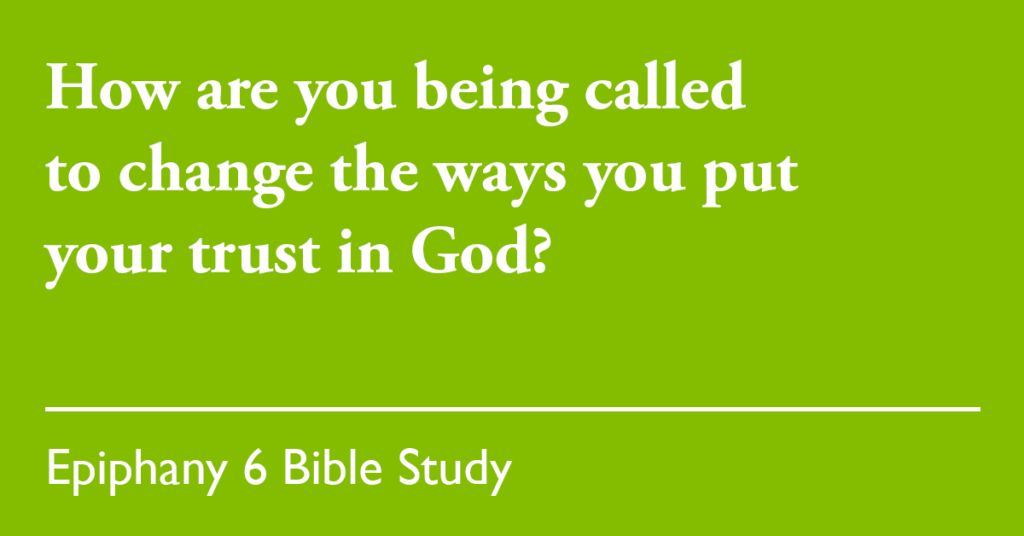Bible Study: Epiphany 6 (C) – 2022
February 13, 2022
RCL: Jeremiah 17:5-10; Psalm 1; Corinthians 15:12-20; Luke 6:17-26

Jeremiah 17:5-10
In this piece of wisdom literature, Jeremiah gives a somewhat stark vision of what occurs when we put our hopes in things of this world. We become withered or shriveled versions of God’s hope for us, unable to envision the relief that God provides, placing our trust instead in worldly strength or power. As humans, we have a propensity to turn toward the things of this world which we think will provide us comfort. We are often more inclined to be distracted, to turn away from God, to have hearts that seem crooked or not fully aligned with God’s. More mysterious, we often can’t understand it. Why do we return to habits or behavior we are not proud of? What keeps us from fully living into the blessing of fully trusting in God?
The simplicity of verse 7, “Blessed are those who trust in the Lord, whose trust is the Lord,” is deceiving. We read of well-nourished, deep-rooted trees, unafraid of heat or drought, and wonder how this can be, particularly in a time that seems so wrought with our own literal and metaphorical heat and drought. Our hope, then, can be found in a God who searches our hearts and sees where we have fallen short. In seeing this, God encourages our turn and return to find the lushness of life, the loss of anxiety that is possible in God.
- How do we trust in a God who mysteriously knows us, our desires and our failings, so well?
- How do we participate in the turn and return to God when the distractions of the world have drawn us away?
Psalm 1
Psalm 1 shares with Jeremiah the imagery of deeply rooted, fruitful trees contrasted here with the imagery of chaff, something akin to corn husks or other parts of a harvest that get thrown away. It can become easy to pit these two images against each other, assigning the trees and the chaff in our lives, based on our perceptions of ourselves and our neighbors. What might it mean to project this psalm internally even more, rather than outwards, perhaps in judgment, toward others? Being human is complicated, and we are rarely fully good or fully sinful. How might we recognize the areas in our lives that have been deeply rooted, that provide nourishment for our relationship with God and the world? How might we be able to recognize the sinful or worldly areas that lack rootedness, the chaff that we may be holding too tightly for the wind to take it from us?
- What areas of your relationship with God and the world could be seen as the deeply rooted tree?
- What areas of your relationship with God and the world could be seen as the chaff, waiting to be blown away?
Corinthians 15:12-20
We often become tied up in the need for direct, thorough answers. Paul, in his arguments to the Corinthians around the nature of Christ’s bodily resurrection, is, in some ways, no exception. Paul is speaking to those who may not believe in the resurrection of Jesus, particularly naming a variety of things that would make the work of him and other early followers of Jesus seem empty or in vain if this resurrection were not true. When reading Paul’s words, there is a sense of urgency from him. He presents his arguments in ways that both focus on the human experience—despair of remaining in sin, pride or fear of misrepresenting God, futility of faith without hope— and illuminates the tragedy of life lived only for this human world. Even in Paul’s words of persuasion in these verses, there seems to be an opportunity for more wonder and mystery around what God is doing through resurrection.
- Do we have to know the specifics of how God worked through the resurrection in order to trust in its power as a saving act for creation?
- How often do we, in an attempt to reason out the way God works in the world, allow our own pride to limit the access we have to the mystery of God?
Luke 6:17-26
In Luke’s Sermon on the Plain, Jesus comes among his followers to preach of God’s love and preference for those who presently experience struggles in this worldly life. Jesus seems to expand on the verse from Jeremiah— “Blessed are those who trust in the Lord, whose trust is in the Lord”— to name specifically the ways that those who are poor, who are hungry, who weep, and who are questioned or hated will experience their trust in God to be fulfilled. One of the themes of these lectionary readings—of finding personal relief or comfort in the things of this world, which turn us away from God—is nuanced by Jesus, who names that those who experience fulfillment while on Earth have not avoided experiencing the hardships. What might it look like, for those seeking comfort, renewal, or care, to seek beyond the worldly options, and more fully commit to trusting in God? How do our times of struggle and times of prosperity change if we remain turned to God in similar ways during these different times? Jesus’ sermon here, particularly considering his audience, invites us to persist in our trust in God and challenges us to consider and change the ways we are putting our trust in places other than God.
- In what ways have you found yourself putting your trust in God? Are there life circumstances that make this easier or more difficult?
- How are you being called to change the ways you put your trust in God?
¡No olvide suscribirse al podcast Sermons That Work para escuchar este sermón y más en su aplicación de podcasting favorita! Las grabaciones se publican el jueves antes de cada fecha litúrgica.


